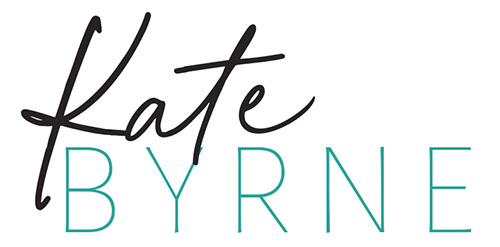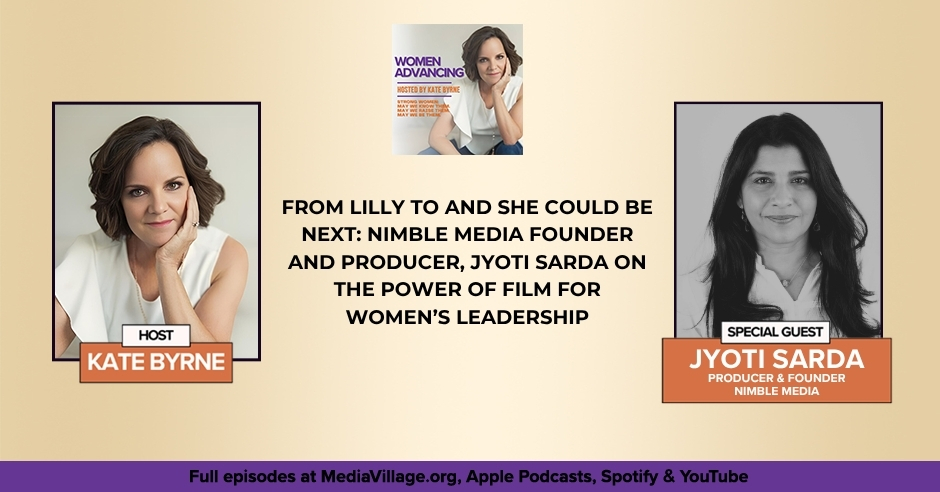
Stepping into your purpose and leaving the comfort of a major media brand like Fox or Paramount takes immense courage, a topic we dive into with Jyoti Sarda, founder of Nimble Media and producer of impactful films. Jyoti shares her journey of transitioning from the corporate world to independent filmmaking, covering the realities of fundraising and launching your own venture with eyes wide open. Her projects, such as And She Could Be Next and the recently launched LILLY, starring Patricia Clarkson, are impactful. LILLY notably chronicles the story behind the Lilly Ledbetter Fair Pay Act, which became Obama’s first law during his first term. Together, these films underscore the vital importance of female voices, votes, and candidates in politics, proving that film and media are powerful platforms for driving change and lasting impact.
—
Watch the episode here
Listen to the podcast here
From LILLY To And She Could Be Next: Nimble Media Founder And Producer, Jyoti Sarda On The Power Of Film For Women’s Leadership
Lights, Camera, Change – Raising The Voices And Votes Of Women
What does it take to lead the credibility of a major media brand to start something of your own? When I use the phrase major media brand, I’m referring to brands like Fox and Paramount. That major and that household name. For Jyoti Sarda, our guest, it meant trading the safety net for a bold new mission, and telling stories that drive civic engagement and shift culture. Thereby, she didn’t say it, but I’m going to provide a legacy for generations to come.
Now, as the founder of Nimble Media and the producer behind projects like LILLY, which is the story of Lilly Ledbetter, and And She Could Be Next, which chronicles the elections of five women of color on their electoral journey, Jyoti is using film and media to spotlight movements, elevate underrepresented voices, and create impact so far beyond the screen. In this conversation, we talked about stepping into purpose, navigating risk with clarity, and why the future of storytelling is much about strategy, as it is about soul. I can’t wait to hear what you think. Remember to stay to the end for KB’s takeaways. Thanks.
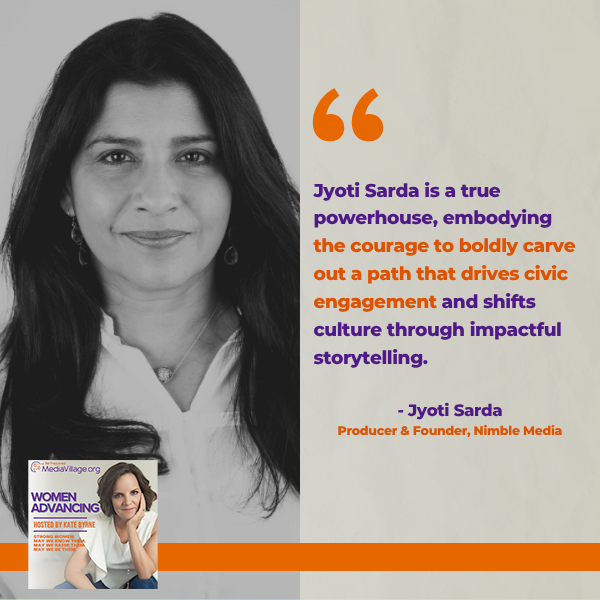
Everyone, we are so in for a treat because we’re going to get to sit down with Jyoti Sarda who is the Founder of Nimble Media and the producer of two documentaries and films that go beyond just documentaries, like And She Could Be Next, which came out in 2024 and now, the talk of the town which is LILLY, which is the story of Lilly Ledbetter and stars Patricia Clarkson. More importantly, I knew Jyoti back when. We’ve known each other since 2016, when we started at the Girls Govern. Welcome, Jyoti, to Women Advancing.
Thanks, Kate. It’s interesting because I’m here in DC. I don’t live in DC, but that’s where we put on the Girls Govern Conference back in 2016.
The Leap: Why Leave Fox And Paramount For Independent Film?
I know. It has all come full circle. It is perfect. Through that program, we worked with Participant Media. The reason why I’m so excited to talk to Jyoti is because she is the embodiment of someone who in 2016 said, “I’m tired of doing what I’m doing. I have this dream. I want to do this thing.” Fast forward, she did it. Not only has she done it. She’s done it very well, so we’re going to find out a little bit about that story. Tell us about it. How did you get here? You might have a pivot. You were at Fox and Paramount and then at Nimble Media.
This is my third career. I started out in advertising. I used to work at recognizable advertising agencies, and I loved it. That was the genesis of my marketing interests. I always thought it would be interesting to use those skills for social good. I’ve always had that at the back of my head. I progressed from advertising into the other side of the client side, as they call it. That found expression was in the studio system.
I first started out at Fox, where I ended up running the then TV on DVD business, which I’m sure your readers won’t remember, but it was a big business back then. There were a lot of shows. What people talk about are binges, which they used to consume on DVD. That’s what I did at Fox, and then I moved on to work on all kinds of films like Fox Searchlight Pictures and also on Avatar, the first one that came out. I took a bit of a break. That was Nimble Media 1.0, but then I very quickly found another outlet in Paramount, and I started working on the international entertainment division.
There’s a bunch of different remits involved. It was like DreamWorks, CBS, and MTV. We used to have Marvel back in those days. There were a lot of fun titles to work on, and then I’m fast-forwarding the five years that I spent having a great time putting all of those titles out. Part of it is when you work in a big corporation, there are always rounds of layoffs. Every time that happens, even if it doesn’t happen to you, you think, “What would I do?” I thought to myself, “I need to have another plan.”
I started thinking about entering the digital part of the business, which I didn’t have as much experience in. In the process of that, I ended up quitting my perfectly good job at Paramount. It was a nice, lovely, and easy job in many ways. In 2016, shortly after which we started working together at the Girls Govern Project, I started to work for a streaming startup. That didn’t work out, but I had already started to go for the first time ever to film festivals and was meeting filmmakers and documentary filmmakers.
I thought in all my wisdom that I would make a documentary about women in electoral politics, thinking that with Hillary running for office, I had my perfect ending. I found out never script your documentary endings because that didn’t work out, but that did launch me into the world of producing. That’s where I’ve been since then.
Unforeseen Challenges: Blind Spots In The World Of Producing
What were the blind spots that you didn’t see coming? You leave comfy corporate, and you’re doing impact work for sure. What were some of the blind spots that you came up with? Were any of them ever so big and vast that you thought, “I’ve got to go scurry back?” Maybe not since you haven’t.
We’re going to have some straight talk here because one of the things that is important to know is I had a safety net when I hit that lead. If I hadn’t had that, I would have spent several years in very nicely paying jobs. I not only had my own nest egg from which to go off and launch a risky career move. I am also married, and I had a safety net. That is very critical because if I didn’t have that, I would have a different experience. You do end up with long periods of time when you’re working on projects, and you are not seeing a financial return.
Sometimes, because of the nature of these projects, which are not always commercial, the financial return is not as grand as one would hope. The one thing that was a complete blind spot on my part was that I hadn’t intended to launch into producing. I just thought I’d helped a friend work on a documentary about the Equal Rights Amendment. In doing so, I learned so many things about our legal system and how women are truly not protected in it. It was an activism at that moment in 2016, and for those of you who can remember, that’s when many of us started to become more politically active because of the nature of the political landscape.
I thought if more women understood this part of the system, how powerful their vote was, and how important it was to have elected officials who looked and thought like them, we would have a better system of governance and we would easily pass the Equal Rights Amendment because there would be these very logical thinking women in office who would understand that we needed it. What I was wrong about was the fact that my business or my marketing background was going to make the process of filmmaking easier. That was my big blind spot. It did not make it easier.
Did it help at all?
It helps when it comes to being an excellent partner on a filmmaking team and a partner who, often, filmmaking teams don’t have because I do understand what happens after a film is made, and I’m not afraid of it. It’s helpful when it comes to impact work because so much of figuring out how to take a piece of content, a story if you will, and get it to its intended audience in a meaningful way is by marketing.
I will say yes. That did eventually end up being an excellent skill set to have. It just didn’t make the process of filmmaking any easier. I have a lot of respect. Everyone who steps off into a new career does it, butt understand that it’s always good to investigate the landscape a little bit and not have too much hubris about how you can make it easier for yourself because sometimes it’s not any easier.
That’s very sage advice, too, because so many times, and I speak for myself here, it’s so easy to say, “I’m going to be different. It’s going to be different.” Someone could say, “How is it going to be different?” It’s like, “It’s me. It’s going to be different.” That will make all the difference in the world. I am the special sauce.
We are the special sauce, and I would still say go do it. Whatever it takes to get you to jump off is good. Sometimes you need a little blind spot. Otherwise, we’d all be too worried about what happened next.
Film As A Force: Storytelling For Social Change
Why do you think film, in particular, is such a strong avenue or platform for this kind of storytelling?
There are a lot of different platforms, and I respect all of them. I do think about storytelling because it doesn’t have to be a film. It only happens to be a medium I’m comfortable with, but I’m very podcast curious, for example. That’s a great storytelling medium. There are a lot of different ways to tell stories, and it all starts with the fact that when I was in advertising, we were our best ads. We’re telling stories in a very short amount of time.
Marketing comes from doing that, and not just telling people what you want them to know, but you get them to think about the way you want them to think by telling them a story that resonates with them, that then causes them to want to take action. Good filmmakers do that, too. They may not be completely clear on the action that they want to take, but somewhere in their souls, they have some idea of why they want to tell the story and some idea of what the intended reaction is that they’re trying to pull out of their viewer. Also, storytelling hits on so many different modalities. It’s emotional, logical, and sets an emotion if you’re doing a film. I don’t know if that’s a complete answer, but it’s some of the things that attract me to this particular medium.
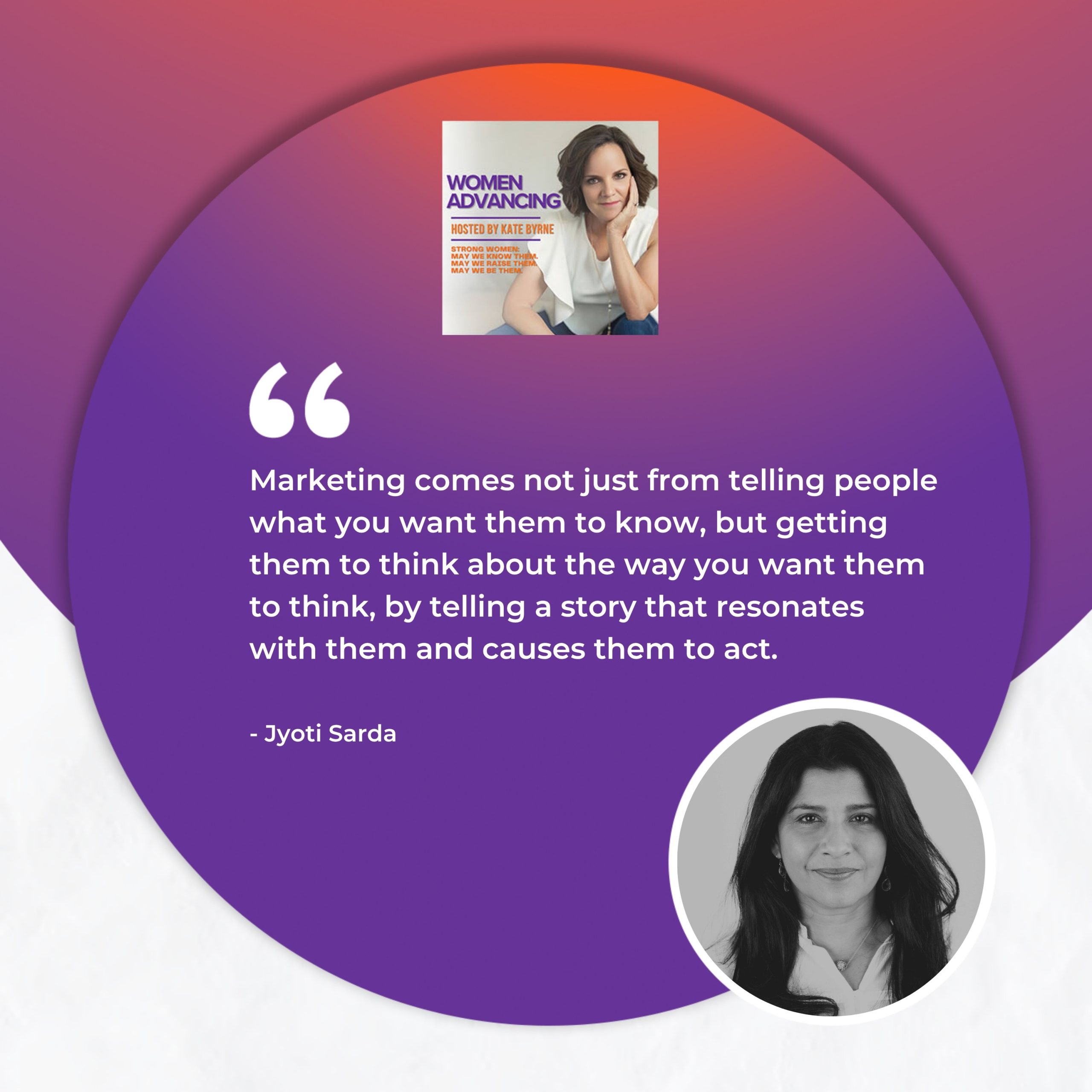
It makes sense because I would think sometimes with some stories, it might be hard to find that balance between the story, the arts, and the advocacy. You want to get this message. Those two films in particular, And She Could Be Next and LILLY, are important stories. Your tummy is quite intentional and impeccable.
They’re different. The documentary is different. One of the things that is important, going back to storytelling, is you want to try to avoid telling people how to think and feel.
You don’t want to be preachy.
Documentaries can fall into a trap of being good for you, like healthy food. This is good for you to see this, but there are some great documentaries out there that also manage to tell an emotional story and grab your heart. Usually, what happens is that the best documentaries have these phenomenal characters at the center. People want to know more about them, and then you get the important facts and the advocacy, if you will, through following that character.
Maybe you’ve seen this. They’re called Talking Heads. You have somebody on camera, and they’re telling you. You have some facts flashing. I don’t know if those are as resonant for people. They can be, I suppose, but the ones that last with you are the ones that touch you in a different place. I think feature films do that in an even better way because you’re fictionalizing the narrative, and you get to play with all the levers of fictional storytelling. You have a great actor or actors who tell those stories in even richer and more emotionally resonant ways.
The ones that truly last with you are those that touch you in a different place, and feature films do that. Share on XElevating Overlooked Narratives: The Power Of Diverse Stories
They make it all so incredibly relatable, and that’s what I was thinking. For some, they can see themselves or hear themselves, or can understand what the characters are going through, because you have to see it to believe it. For those who have been naysayers and possibly witnessed it that way, that might be a way of opening a door or sticking a foot in. One of the things I know you’ve spent time on, too, is lifting up the voices and the stories of populations that are so often overlooked. What do we lose when those stories aren’t told? What do we gain when they are?
I gravitate towards those stories. Maybe it’s because I am the daughter of an immigrant, or I am of Indian background. I was born in this country. I’m very much an American. I just gravitate to stories that feature people with whom I have something in common. Maybe not directly, but something that I can access their experience. What is missing is whether you keep watching stories about people. It’s like when you surround yourself with people like yourself, you never expand your own consciousness.
Life is a little bit more boring, frankly. It’s fun for me to learn and engage with people who are different. Sometimes it’s also annoying, but generally speaking, I like meeting different people and hearing stories from all walks of life. That’s missing for everyone. Even if they don’t agree with what the character’s point of view is, you’re getting a window into some other life that expands your own.
When you surround yourself with people like yourself, you never expand your own consciousness, and life is a little more boring. Share on XHas there been any change as far as you’re getting support as a woman, as you said, as a daughter of immigrants, as a woman of color, as it were?
In some ways, yes. What’s happened since 2016? Having more than one woman run for president has certainly been interesting. Both of those candidates raised an enormous amount of money for their campaigns. People got comfortable backing women running for office. That’s one general backdrop. Also, within that time frame, we had several movements. We had a # MeToo Movement and Black Lives Matter. Those movements also raised consciousness of underserved populations.
While there’s been a rise and a fall behind that, now there’s a backlash against it. Still, what you have is people who got used to and are just backing or being interested in, or engaging with certain populations, and that is good. Also, the people or the funders, who are most interested in making sure those stories are being told, became more focused in their support. In the wake of the first Trump presidency, we were raising funds for And She Could Be Next.
It started out being a little bit broader about women in elected office and ended up being more focused on women of color running for elected office because that was the only bright spot that came out of that election cycle. There were five interesting women, and one of them was Kamala Harris, who was elected as Senator from California. Another woman was Pramila Jayapal, who is now a prominent leader in Congress. It was an interesting time.
We followed that trend, and people would ask us, “Why only women of color?” We had to say that it’s because we’re covering a couple of different trends, and we feel the advanced way of change can be found through these candidates. Frankly, we find that if you look to see what these candidates are doing, whether you agree with them or you don’t agree with them, you’ll find that they are bold, authentic, and at the forefront of their movements.
In that same way, we were able to find full funding. Because of our viewpoint, PBS picked up our series, ran it, and played into the 2020 election. With LILLY, what was interesting, everybody had heard of Lilly Ledbetter, even though this is a battle of a working-class white woman from the South. Everybody has heard of this story, and she has an everywoman, every man type of quality because if you’re working class, you relate to her. She never was a divisive figure. She wasn’t a divisive figure politically either. She also worked with people across the aisle in the pursuit of legislation.
What we found was that people were very eager to bring her story to the screen. We’re able to get what you call equity investment in the movie. We’re also able to get donors because there’s a social return on this movie. After the Dobbs decision, our fundraising improved, even though this movie did not. The storyline behind LILLY is more about pay equity than it is about reproductive rights. In general, a lot of female donors saw that we needed to have stories about strong women fighting for change out in the world, and we were one of those stories.
That would be my answer. In this moment, it’s a tough time because funding is being cut from all kinds of arts organizations. There’s a real attack on DEI. Therefore, companies are thinking twice, and potential sponsors are thinking twice. They might be advocates for DEI, so to speak, or diversity, for sure, but they want to steer clear of controversy in this moment, or they don’t know what to do. Nonprofits, who would typically have funded a project, not only have lost their funding but are sitting back and trying to think about what their strategy is. It’s a bad time in 2025.
Defining Success: Impact Beyond The Box Office
I’m glad that you were able to get the other, though, at least to get it up and going. With all that, you’re not just chasing ratings at the box office but also impact. How would you define that success, or what would that look like?
Participant, which is also sadly defunded. It used to have what they called a double bottom line. As a film team said, we owe a social return to our supporters, and we owe a financial return. We believe we can do both. We have a movie that is entertaining, well-acted, and has a gripping storyline at the center of it. Regardless of whether you’re trying to create some social change, it’s an enjoyable movie to watch. People like these types of movies. In the past, if you think about a normal array or an Erin Brockovich, it has been award-winning roles for these actors and they have proven themselves at the box office. That was always the approach we took, and that’s what we’re still trying to take.
That will be great to see. It’s interesting out here because Charlottesville is more of a university town, but there’ve been other folks, friends from the Bay Area and all that. A lot of people, it feels, are turning to film as a tool for change. Do you have any advice on where they start or what not to do, like, “Watch out?”
Aspiring Filmmakers: Advice For Starting Your Journey
It’s understanding that there has to be a long horizon, and that the project could take time. Whatever you need to prepare yourself for that, having a safety net of sorts, whatever the safety that looks like, is important. Understand that you’re going to work on it as a side hustle, if you will, for a while. It all depends on how you’re going about it. The first place to start is in a story that you feel you need to tell. If you don’t have that, then it won’t keep you going during the tough times, and there will be tough times.
For all of these stories that I’ve been a part of, I wanted to tell the story. When we encountered obstacles, the determination to get the story out in the world was helpful among all of us. Inevitably, somebody gets frustrated or has a personal issue that they have to deal with. There are things that come up in life, and then the other person on your team lifts you up and keeps you going. It’s the story that pulls you forward. It has to be something that’s not like what you think in your head could be an award-winning movie. It could be, but you don’t know that.
“This could make a lot of money.” It could be, but you don’t know that either. It has to be something you want to work on for several years, and you feel it needs to be told. You also try to figure it out. Here’s one thing I did. When I was starting out with And She Could Be Next, I had not made a documentary myself. I had helped other people. I looked for people who knew what they were doing to partner with. I had a great story idea, and I had my own skillset, but I didn’t have practical production knowledge the way other people who have done this for decades do.
I found partners who were super skilled at that. There’s always a bit of friction with somebody. It’s like when you’re playing tennis or pickleball now, with somebody who’s not quite their level, and you’re like, “Maybe you need to go take a lesson before you come play with me.” If you find that right mixture, then you are making sure you’ve covered your bases. Inevitably, somebody else will want to tell the same story you want to tell. Maybe they’ve done it before, and that can speed things along because they will have a sense of road bumps that you don’t need to go through because they already have. Those are some thoughts I have.
Thank you for those. We were talking about, inevitably, there are frustrations, and you run into obstacles. What do you do when you run into those? Was there something that you’ve turned to?
It’s different things. For example, I worked on a documentary called Black Barbie, where I helped the filmmaker Lagueria Davis in the beginning of her journey, and helped her put together a pitch reel and went with her to pitch meetings. I found I didn’t have the time to see it all the way through. It was also coming into a time where we felt she needed to have a Black producer working with her. It was that time period, but we helped her find that person, then she took the last two legs.
It’s okay to be helpful in whatever way you want to be helpful. For And She Could Be Next, my partners and I were driven by the political moment. This was our political expression. We were driven by the people we were following because we filmed in 201,8 and then it came out in 2020, but we knew we wanted this. We had a very specific idea of what moment we wanted this to come out into. We were so inspired by the women who were running for office and the organizers who worked around them.
I can’t tell you how uplifting and determined we were. That was that particular. For LILLY, it’s a lot longer and has different phases of time. There was a fundraising phase, a production phase, and then a release phase. We have quite a few producers, and each of us played different roles in different phases. We all helped each other because someone would end up losing or feeling, “This is too hard.”
Someone else would have the spirit that was needed to keep going, and also, different people took the lead. It wasn’t just me or the director, or the lead producer who was working on the production itself. It was all of us doing a bit of baton handoff, which sometimes is also important because sometimes you have to pay attention to your life and other things that you’re doing.
That was one thing I was going to ask because working in a collaborative cohort like you did, sometimes that works, and sometimes it doesn’t. It sounds like, for you, for the most part, it did. It was such an ebb and flow, probably because of the story. If I’m getting this right, it was less about power dynamics and more about the story and getting this tale out there.
I don’t think it would be honest to say that there wasn’t a conflict or just friction. It just is. Especially, I tend to work with very strong-willed women, and we are all type A. We all want to get things done, and that would be a falsehood. There was definitely conflict. What pulls you forward is wanting to tell the story. You work it out because what I have found is that always at the heart of it is the commitment to the story. In our case, we had an actual live person, Lily Ledbetter, whom we wanted for that story.
I don’t know whether to call it a power dynamic. It can express itself that way. People feel passionate, and they see that they have a solution. Maybe the other person doesn’t see it that way. You have to work these things out. I can’t say exactly how. It is worth getting to know the partners that you plan to. It’s like a marriage of sorts. It’s very intense and intimate in many ways. You spend a lot of time with people on a project. Sometimes, you’re working on different projects at the same time, so it’s different dynamics. Being flexible is certainly helpful.
Going in with eyes wide open because so often, some people think, look, and hear on the other side of going through making a film, and everybody gets up there. They’re shaking, waving, and saying, “We did it.” Everyone thinks, “They’re so lucky. It’s always like that. We fight like this left and right.” It’s okay to do that because it’s human nature, and you’re not alone.
It is, especially when you’re passionate and strong-willed. Those are some of the qualities that generally attract people to this work anyway.
Parting Wisdom: Advice To My Younger Self
It’s a great way to put a lot of positive energy towards something. In closing, I always ask this question, but I love this question because it’s one that’s helpful. Knowing what you know now, what advice would you give your younger self?
It’s interesting you should say that, Kate, because I have a daughter who is starting out in the workforce. I try to tell her the advice that I have learned. You also have to let people make their own mistakes, as it turns out, which I am trying. I do say to her, “Don’t say sorry. Erase that from your vocabulary. You can explain why something has happened that went awry, but you don’t have to say you’re sorry.” We all as women say sorry too often. That’s one. I am guilty of that as well.
You can explain why something went awry, but you don't have to say you're sorry. We all as women say sorry too often. Be bolder. Share on XI would be bolder. Don’t be so afraid, especially when you’re young. I don’t want to say it doesn’t matter, but take risks. Now is the time to take risks. When you have children and a mortgage and or rent, when there are other responsibilities, I’m not going to be so flippant, even though I do believe at that point you should take risks. It’s harder to take risks. People are depending on you. Life isn’t so flexible.
I do think you can take risks and go down avenues that may not look like they will pay out because maybe they will or they will add something to your life that you can’t predict from where you are now. I say surround yourself with interesting people. Maybe those are the three things. Like you, Kate. You’re the gift that keeps on giving. I haven’t seen you for a while, then we connect like it’s been no time at all.
I know. That’s what I love so much. I was going to ask you about your daughter. I’m glad to hear that I’m not the only mom whose daughters still don’t listen to her, or they think, “If I get one more eye roll,” and yet someone else tells them the same advice, like, “This is brilliant.” You think okay. I’m pretty sure I probably did the same thing, so that goes right back to that. It’s human nature.
Maybe our younger self wouldn’t have listened to us.
That’s exactly right. They would have said, “Talk to the hand. Sorry.” Jyoti, it’s such a pleasure. I’m so glad we reunited, and it feels so good. Thank you for all your different windows and pearls of advice for folks who are reading. I can’t wait to see what you come up with next, and I will be clapping. If I had a vote at the academy, you and yours would obviously win.
Knock on wood.
Thanks so much.
Thanks, Kate.
—
It has been such fun getting reunited and reconnected with Jyoti. She is such a powerhouse on so many different levels. Our relationship is a perfect example of what Jyoti speaks about at the end, where they’re going to be some projects. You’re not going to be quite sure why you’re getting involved, but you’re going to walk away with something that is important. There are two things. One was a fire in her belly, to go, be bold, take that step, and start that film and her Nimble Media Company.
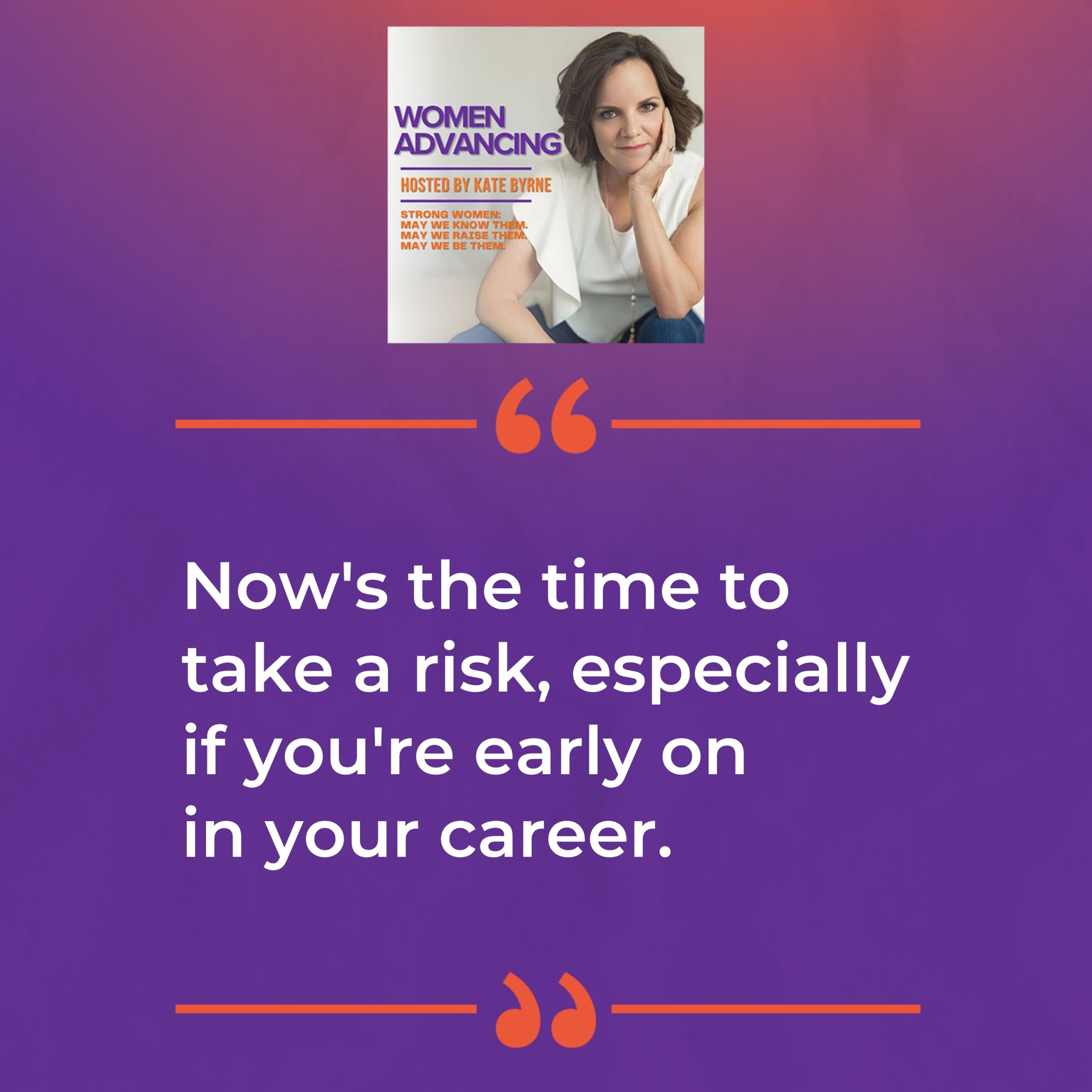
Second, clearly yours truly. In all seriousness, KB takeaways, which I thought resonated. First and foremost, a film is essentially a startup effort. It’s a startup program and a startup company. All the fundraising advice and suggestions that she makes are relevant to all you find yourself out there, for sure. Second, in every company and every partnership, there are going to be at least two people involved. You’re going to have different opinions and such. Remember to go higher and go for the bigger thing rather than just what your own little ego play is.
If you tap into that, that’s what’s going to help you get through the other side, because so many smart projects, efforts, companies, and programs have been taken down to their knees because of ego. Don’t let that happen. Third, I loved her advice to herself to be bolder. Don’t be so afraid. Especially if you’re early on in your career, now is the time to take a risk.
Fast forward, if you are and find yourself in the fortunate situation where you do have access to a plan B or a safety net around you, jump into that pool and take that risk. It’s okay. You’re going to have more regret and be more harmed by not doing so. Finally, don’t say sorry. Just dip it. Don’t say it. That, and I’m going to slip one more in. It’s never just you. It’s you, and that’s a lot. Thanks so much for reading. I look forward to the next conversation on Women Advancing.
Important Links
- Jyoti Sarda on LinkedIn
- Jyoti Sarda on Instagram
- Nimble Media LLC
- And She Could Be Next
- And She Could Be Next Official Trailer on YouTube
- LILLY | Official Trailer on YouTube
- Fox
- Paramount
About Jyoti Sarda
 Jyoti Sarda is the Founder of Nimble Media LLC, a content production and strategic consulting company. With over twenty five years as a senior-level global marketing executive at Fox and Paramount, she brings expertise in major studios and blue-chip brands to the creation of socially relevant, humanistic documentary and narrative content.
Jyoti Sarda is the Founder of Nimble Media LLC, a content production and strategic consulting company. With over twenty five years as a senior-level global marketing executive at Fox and Paramount, she brings expertise in major studios and blue-chip brands to the creation of socially relevant, humanistic documentary and narrative content.
Jyoti is Producer of the award-winning documentary series And She Could Be Next (2020) and the dramatic feature LILLY (2025), starring Patricia Clarkson which is currently in theatres. She is also Co-executive Producer of Equal Means Equal (2016) and Sirens (2023), and Executive Producer of Black Barbie (2024).
Previously, Jyoti held leadership roles at Paramount and Fox, overseeing global marketing for top entertainment brands and managing international releases for major franchises. She began her career in advertising at Ogilvy & Mather and J. Walter Thompson, working with brands like Kraft, Dole, and Mattel.
A longtime advocate for gender and racial equality, Jyoti serves on the advisory board of LAANE and has served on the boards of GlobalGirl Media and the ERA Education Project. She holds a degree from USC and an EMBA from UCLA.
Jyoti is a frequent speaker and programmer at panels, podcasts, and conferences, sharing practical insights on career transitions and empowering others to find their voices and inspire change.
